Photo: PixieMe / Shutterstock.com
Google is considering a significant shift in its search business strategy by exploring the possibility of offering ‘premium’ features driven by generative artificial intelligence (AI). This potential move could mark a departure for Google, which has traditionally provided its core search product for free with revenue generated from advertising.
The company’s proposed changes would involve integrating AI-powered search capabilities into Google’s premium subscription services. These services, which currently include access to the Gemini AI assistant in Gmail and Docs, may see the addition of advanced AI features designed to enhance the search experience, noted Financial Times.
Google’s exploration of premium AI features aligns with the industry trends towards monetising advanced AI capabilities to enhance user experience.
Despite ongoing development efforts by engineers, Google has not yet decided on the launch timings or specific features to be included in the premium offering.
It is well known that AI-driven search results cost companies more than organic results. In a detailed report, Reuters, citing various researchers, reported that AI search results could increase costs by about $3 to $6 billion. These extra costs will likely increase as more people opt for AI answers.
This strategic consideration also comes against the backdrop of Google’s response to competitive pressures posed by advancements in AI technology, such as OpenAI’s ChatGPT. Since the introduction of ChatGPT, Google has been exploring ways to address the potential impact of AI chatbots on users’ search behaviours and advertising revenue streams.
In an attempt to innovate, Google last year initiated experiments with AI-powered search services, offering more detailed responses to user queries while continuing to display advertisements. However, integrating these AI features into the main search engine has been gradual, reflecting the complexities involved in scaling AI-generated content.

While competitors like Microsoft have already introduced AI-powered search functionalities in Bing, the impact on market dynamics has been limited. Analysts caution that Google’s business could face challenges if AI-generated answers reduce user clicks on advertiser websites, affecting both revenue and traffic to external sites, many of which are publishers.
“For years, we’ve been reinventing Search to help people access information in the way that’s most natural to them,” said the company. “With our generative AI experiments in Search, we’ve already served billions of queries, and we’re seeing positive Search query growth in all of our major markets. We’re continuing to rapidly improve the product to serve new user needs.”
It is important to note that Google has not announced plans for an ad-free search experience. Instead, it emphasises integrating premium AI features into its existing paid service suite.
With the AI hype gaining traction, the associated problems are also rising. One such issue is the sudden spike in undisclosed AI content in academic publishing. Furthermore, AI is helping websites churn out content rapidly, making them goldmines for misinformation and unverified news.
Last year, it was also reported that generative AI tools are helping content farm websites to plagiarise news articles. In March 2024, Google changed the algorithm to root out low-quality AI-generated content. This is why the European Union had asked Google and Facebook to label AI-generated content.
In the News: OpenAI lets premium users edit DALL-E images within ChatGPT






